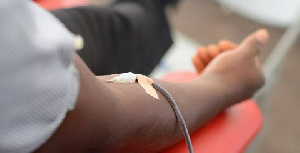 File photo of blood transfusion
File photo of blood transfusion
Health Experts say refusal of blood transfusion is not synonymous to rejection of medical care and caution against rejection and stigmatisation of people who refuse blood transfusion.
They said the decision not to accept blood transfusion was not ethically and medically wrong and per Ghana’s legal regime and other international conventions, the patient had the right over their health needs.
Mr Sackitey Sackey, an Associate Director, Hospital Information Department of Jehovah’s Witnesses, Ghana, said there had been alternative medications that had been proven and tested in Ghana and across the globe.
He was speaking during a media sensitisation on the topic: ” The Medical and Ethical Challenges -Those Refusing Allogeneic Blood Transfusion,” using the Jehovah’s Witnesses as a Case Study Group.
The engagement sought to bring to light the importance of alternative medication and Patient Blood Management (PBM).
Mr Sackey said: “If anyone or doctors say it is only the blood that patients need to survive, that is not so but there are alternatives.”
He said the application of alternative medications would help reduce the amount of blood required at health facilities and limit the adverse effect of blood transfusion.
“It reduces health care costs, the cost of the health system and mortality,” he said.
The Jehovah’s Witnesses are said to be stigmatised for not accepting allogeneic blood transfusion (someone’s blood to another person) and autologous blood transfusion (reinfusion of blood or blood components to the same individual from whom they were taken).
However, a witness may decide to accept certain uses of their own blood in their medical care.
The World Health Organisation (WHO) in its policy brief calls for the urgent need to implement patient blood management to address the risks of iron deficiency, anaemia, blood loss and coagulopathy.
The policy brief said: “PBM is a patient-centred, systematic, evidence-based approach to improve patient outcomes by managing a patient’s own blood through diagnosis and etiology-specific treatment of anaemia and preserving the patient’s own blood by minimising blood loss and bleeding whilst promoting patient safety and empowerment.”
Mr Samson Kraikue, a Clinical Pharmacist and Director, Hospital Information Department, Jehovah’s Witnesses, Ghana, said blood transfusion was not sacrosanct to the survival of patients.
He said alternative medications had proven to be simple, easy, efficacious, and cost-effective in cases of trauma and emergency, especially based on the type of alternative used and time it had been used.
“There have been instances where people die from blood transfusion and the cost of managing blood transfusion reactions is huge. You have no idea,” he said.
He said it was possible to manage road accident victims, who had lost blood without allogeneic blood transfusion and that the country needed to develop protocols to care for patients in the absence of blood transfusion.
Dr Emmanuel Akorli, Specialist Medical Doctor at the Tamale Teaching Hospital, said: “We have experienced patients, who come in with very low hemoglobin and the patients are managed with these alternatives and they survive. So, it is true, it is possible, it works.”
“It is unfortunate some of our doctors just do not want to try the alternative, but there are others who have embraced it,” he said.
